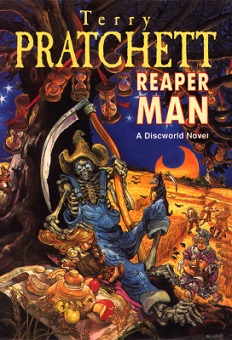
Reaper Man
Terry Pratchett
287 pages
published in 1991
Even before rereading the day after pTerry's death, Reaper Man was mired in grieving for me. Because I reread it in 2012, the year after Sandra's death, when I had fallen back on Pratchett's Discworld series as comfort reading, something to lose yourself in and forget for a while. And then I hit Reaper Man, in which DEATH has been retired by the Auditors for having become too human, has to find a new living as BILL DOOR and a fragile, predoomed romance starts between him and Miss Flitworth, the never married widow he ends up working as a farmhand for. It's a novel about death and life and humanity and the essence of it is captured by what DEATH argues at the climax of it:
LORD, WHAT CAN THE HARVEST HOPE FOR, IF NOT FOR THE CARE OF THE REAPER MAN?
That's a sentiment, for all its vaguely Christian overtones, I can get behind. DEATH himself has started off in the first two Discworld novels as a somewhat evil incarnation of the Grim Reaper, through his obsession with reaping Rincewind, but after this had been established as conscientious and extremely careful in doing his job and that quote sums it up to a tee. The harvest needs to be done, but it has to be done with care and attention -- there's a great scene in which BILL DOOR turns out to scythe the wheat one blade at a time and is still faster than everybody else. And it's this what the Auditors object to.
The Auditors are one of the first of Pratchett's standins for faceless capitalism, or so I like to read them. No identity of their own, no interest in anything that makes humanity, well, human, no interest in seeing the job done properly, only in that it's done efficiently without any care for the individual case. Their Death is impersonal yet vindictive, an attitude familiar to anybody caught in the crosshairs of any large company's "customer service".
DEATH's retirement as BILL DOOR meanwhile brings to the fore his own humanity, as he learns to live as human, deal with the passage of time and inevitability of well, himself. Seeing DEATH figuring all this out and how to act in daily life, how to become just Bill Door is both funny and sad, especially since you know how it has to end.
Fortunately there's more than enough to laugh about in the book's second plotline, revolving around the wizards having to deal with the fallout of DEATH's retirement as the lack of things dying leads to a buildup of life forces, enlivening things considerably in Ankh-Morpork. Windle Spoons being one of them, who as a wizard is privileged enough to know the hour of his death, but with DEATH missing, this appointment isn't kept so he returns as a zombie. Sort of. His colleagues are considerate enough to try out the traditional methods of dealing with the undead on him, to no avail.
Meanwhile even inanimate objects are starting to feel the effects of the absence of DEATH and amongst an infestion of snowglobes and shopping car trolleys is hiding, leading up to something sinister, something parasitic on cities, the shopping mall...
Even though I've reread this at least half a dozen times, this still makes me laugh out loud in places, as it makes me choke up in others. Pratchett really hit his stride around this time and Reaper Man would be an excellent place to start reading the Discworld series with. It doesn't need much prior knowledge, it shows off both his humouristic and philosophical side and it's representative both of where Pratchett was coming from and where he was going to.
Webpage created 13-03-2015, last updated 19-03-2015.